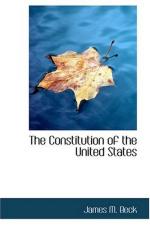“I think often of our situation, and view it with concern. From the high ground we stood upon, from the plain path which invited our footsteps, to be so fallen, so lost, is mortifying; but everything of virtue has, in a degree, taken its departure from our land.... What, gracious God, is man that there should be such inconsistency, and perfidiousness in his conduct! It was but the other day that we were shedding our blood to obtain the Constitutions under which we now live, and now we are unsheathing our swords to overturn them. The thing is so unaccountable that I hardly know how to realize it or to persuade myself that I am not under an illusion of a dream.”
It was, however, the darkest hour before the dawn, and again it was Washington who became his country’s saviour. In 1785, some commissioners from the States of Virginia and Maryland visited Mount Vernon to pay their respects to the well-loved commander. After conferring with him upon the chaos of the times, they decided to issue a call for a general conference of the representatives of the States to be held on September 11, 1786, at Annapolis, Maryland, to discuss how far the States themselves could agree on common regulations of commerce. At the appointed time the delegates assembled from Virginia, Pennsylvania, Delaware, New York and New Jersey, and finding themselves too few in number to achieve the great objective, the convention contented itself by issuing another call, drafted by Alexander Hamilton, then under thirty years of age, to all the States to send delegates to a convention to be held in Philadelphia on the second Monday in May, 1787, “to take into consideration the situation of the United States, to devise such further provisions as should appear to them necessary to render the Constitution of the Federal Government adequate to the exigencies of the Union.”
The dying Congress tardily approved of this suggestion, but finally, on January 21, 1787, grudgingly adopted a resolution that—
“It is expedient that on the second Monday in May next a convention of delegates, who shall have been appointed by the several States, be held at Philadelphia for the sole and express purpose of revising the Articles of Confederation and reporting to Congress and the several legislatures such alterations and provisions therein as shall, when agreed to in Congress and conformed to by the States, render the Federal Constitution adequate to the exigency of the government and the preservation of the union.”
It will be noted by the italicized portions of the resolution that this impotent body thus vainly attempted to cling to the shadow of its vanished authority by stating that the proposed constitutional convention should merely revise the worthless Articles of Confederation and that such amendments should not have validity until adopted by Congress as well as by the people of the several States. How this mandate was disregarded and how the convention was formed, and proceeded to create a new government with a new Constitution, and how it achieved its mighty work, will be the subject of the next lecture.




